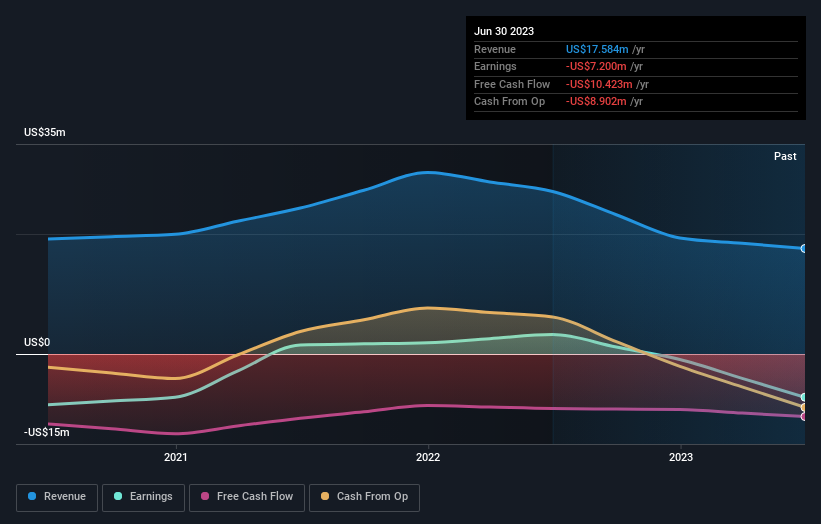Silong Chen Dogness (International) Corporation's (NASDAQ:DOGZ) CEO is the most bullish insider, and their stock value gained 39%last week
Key Insights
Dogness (International)'s significant insider ownership suggests inherent interests in company's expansion
Silong Chen owns 85% of the company
Ownership research, combined with past performance data can help provide a good understanding of opportunities in a stock
Every investor in Dogness (International) Corporation (NASDAQ:DOGZ) should be aware of the most powerful shareholder groups. We can see that individual insiders own the lion's share in the company with 85% ownership. Put another way, the group faces the maximum upside potential (or downside risk).
As a result, insiders were the biggest beneficiaries of last week’s 39% gain.
Let's take a closer look to see what the different types of shareholders can tell us about Dogness (International).
View our latest analysis for Dogness (International)
What Does The Lack Of Institutional Ownership Tell Us About Dogness (International)?
We don't tend to see institutional investors holding stock of companies that are very risky, thinly traded, or very small. Though we do sometimes see large companies without institutions on the register, it's not particularly common.
There are many reasons why a company might not have any institutions on the share registry. It may be hard for institutions to buy large amounts of shares, if liquidity (the amount of shares traded each day) is low. If the company has not needed to raise capital, institutions might lack the opportunity to build a position. On the other hand, it's always possible that professional investors are avoiding a company because they don't think it's the best place for their money. Institutional investors may not find the historic growth of the business impressive, or there might be other factors at play. You can see the past revenue performance of Dogness (International), for yourself, below.
Dogness (International) is not owned by hedge funds. The company's CEO Silong Chen is the largest shareholder with 85% of shares outstanding. This implies that they possess majority interests and have significant control over the company. Investors usually consider it a good sign when the company leadership has such a significant stake, as this is widely perceived to increase the chance that the management will act in the best interests of the company. With 0.6% and 0.1% of the shares outstanding respectively, Sabby Management, LLC and Renaissance Technologies LLC are the second and third largest shareholders.
Researching institutional ownership is a good way to gauge and filter a stock's expected performance. The same can be achieved by studying analyst sentiments. We're not picking up on any analyst coverage of the stock at the moment, so the company is unlikely to be widely held.
Insider Ownership Of Dogness (International)
While the precise definition of an insider can be subjective, almost everyone considers board members to be insiders. Management ultimately answers to the board. However, it is not uncommon for managers to be executive board members, especially if they are a founder or the CEO.
Most consider insider ownership a positive because it can indicate the board is well aligned with other shareholders. However, on some occasions too much power is concentrated within this group.
It seems that insiders own more than half the Dogness (International) Corporation stock. This gives them a lot of power. That means they own US$87m worth of shares in the US$102m company. That's quite meaningful. It is good to see this level of investment. You can check here to see if those insiders have been buying recently.
General Public Ownership
With a 15% ownership, the general public, mostly comprising of individual investors, have some degree of sway over Dogness (International). While this group can't necessarily call the shots, it can certainly have a real influence on how the company is run.
Next Steps:
It's always worth thinking about the different groups who own shares in a company. But to understand Dogness (International) better, we need to consider many other factors. For instance, we've identified 2 warning signs for Dogness (International) that you should be aware of.
Of course, you might find a fantastic investment by looking elsewhere. So take a peek at this free list of interesting companies.
NB: Figures in this article are calculated using data from the last twelve months, which refer to the 12-month period ending on the last date of the month the financial statement is dated. This may not be consistent with full year annual report figures.
Have feedback on this article? Concerned about the content? Get in touch with us directly. Alternatively, email editorial-team (at) simplywallst.com.
This article by Simply Wall St is general in nature. We provide commentary based on historical data and analyst forecasts only using an unbiased methodology and our articles are not intended to be financial advice. It does not constitute a recommendation to buy or sell any stock, and does not take account of your objectives, or your financial situation. We aim to bring you long-term focused analysis driven by fundamental data. Note that our analysis may not factor in the latest price-sensitive company announcements or qualitative material. Simply Wall St has no position in any stocks mentioned.

 Yahoo Finance
Yahoo Finance 

